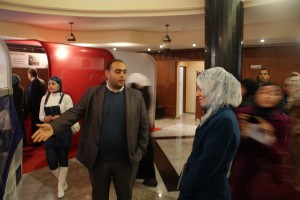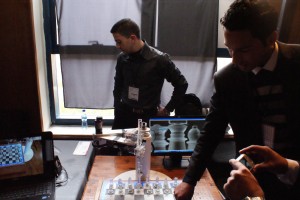The power of Palestinian ingenuity
By Khaled Diab
Outsiders are more likely to associate Palestine with statehood-pending than patent-pending, but innovation is crucial to building a better future.
Monday 16 January 2012

An integrated ‘smart’ system that manages all the devices in your home and business seamlessly. A robot that automatically turns the soil in your garden and waters the plants. Low-cost retinal scanners. Although these innovations may sound run-of-the-mill in Tokyo or Silicon Valley, in tiny, remote Ramallah, they represent the cutting-edge in Palestine’s emerging knowledge sector.
Now into its sixth edition, the ‘Made in Palestine’ fair seeks to change all this by putting Palestine on the global innovation map, before it even makes it on to the world’s political map. The annual exhibition and conference is organised by al-Nayzak, an NGO that works to nurture and incubate the creative and innovative potential of Palestinians from a young age.
But can Palestinian innovators match the success scored by their neighbour, rival and occupier, Israel, which has risen to become the region’s scientific and innovation powerhouse?
Many of the exhibitors and innovators I spoke to in Ramallah were hopeful. Some pointed out that the bumpy road to Palestinian and Arab innovation was already paved with a fair number of good inventions and ideas, but these often did not see the light of day, due to bureaucracy, a shortage of financing, and the absence of a strong industrial and research base.
“The state of Palestinian innovation is similar to that of the Arab world in general,” believes Ahmed Maani, who developed the Tsunami which, despite its destructive name, uses ultrasound to repel insects rather than kill them. “We have thousands of Arab innovators, and tens of thousands of innovations, but they remain neglected and marginalised.”
The situation Maani describes was well summed up in the UN’s sobering Arab Human Development Report, which stated that Arab countries only invested 0.4% of their collective GDP in R&D, compared to 2-3% in the industrialised world.
“But above all, Arab societies and peoples still live with the mentality of the defeated and do not trust any Arab technology,” notes Maani who, despite dedicating six years of his life to developing his latest product, often sees it marketed among Palestinians as being made in Israel because Palestinians do not believe that they can produce any quality products.

The Palestinians have a number of specific factors in their favour and challenges which hinder them. To its advantage, the Palestinian population is among the best-educated in the Arab world. In addition, its large, diverse and extensive diaspora can, as the Jewish diaspora has demonstrated next door, play a pivotal role in both fuelling innovation and financing it. Moreover, if the conflict is ever resolved, the Israelis and Palestinians could become natural partners in business and innovation.
However, for the time being, the Israeli occupation is possibly the biggest single inhibitor of Palestinian innovation and economic development in general. Noting that investing in Palestinian innovation requires “a certain type of intrepid and foolhardy investor”, Maani points to the additional challenges of the restrictions on Palestinian movement, the small size of the Palestinian market and the difficulties and associated high costs involved in exporting.
That said, the circumstances of the occupation can also stimulate the creativity of the ingenious Palestinians. For example, the young innovator Ibrahim Nassar from Hebron, inspired by the movement restrictions Palestinians face, came up with a device which can be used by doctors to diagnose and monitor, via the mobile phone network, heart patients remotely with complete accuracy and reliability.
More generally, Palestinians are planning to wean themselves off their expensive and unreliable dependence on Israel for their energy needs through green investment and innovation. This preoccupation was reflected in many of the Made in Palestine innovations: compressed-air and solar-powered cars, a wind turbine made of recycled material, recycled car oil and solar-powered water desalination.
In the broader context, the Palestinian authority views economic development, partly founded on innovation, as a top priority and a prerequisite for statehood. What has become known as “Fayyadism”, after the Palestinian Prime Minister Salam Fayyad, posits that the first step on the path to statehood is through changing the Palestinians own state of being and building a de facto state-in-waiting.
“Creativity, innovation and excellence are vital tools in the hands of young people building the future of Palestine,” Fayyad said at Made in Palestine’s award ceremony, where an automated potato planter rolled away with the top prize.
But Fayyad admitted that this required wide ranging reforms, including greater support for innovators, the creation of a culture which values innovation, and narrowing the skills gap between the education system and the job market.
This article first appeared in The National on 12 January 2012.


